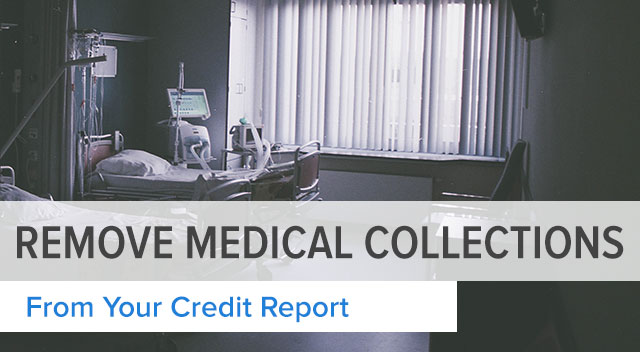Medical funds set off a number of points. Really, based mostly on the Kaiser Family Foundation, nearly 1 / 4 of all Individuals are struggling to pay their medical funds — even after they’ve medical insurance coverage.
In the end, your medical provider will ship your unpaid stability to a gaggle firm which can set off way more trouble because of your credit score rating score will endure.
The good news? You’ll take away medical debt out of your credit score rating report.
How Medical Collections Injury Your Credit score rating Ranking
To begin with, it’s important to understand how medical collections impact your credit score rating score.
Sooner than 2014, FICO (the most common credit-scoring system) dealt with unpaid medical collections the an identical as each different debt.
Once more then, medical debt injury your credit score rating score merely as loads as unpaid financial institution card funds.
Since 2014, FICO has modified its scoring system to reduce the have an effect on of medical debt collections in your credit score rating score. That is good news for individuals who’re dealing with unpaid medical debt.
Nevertheless it really works every strategies: Eradicating unpaid medical debt will improve your credit score rating score decrease than eradicating totally different accounts harking back to financial institution card debt.
Whenever you’ve bought various types of debt flattening your score, I’d recommend attacking a novel kind of debt first.
Nonetheless, getting medical debt off your credit score rating historic previous may assist you to get greater charges of curiosity and improve your borrowing vitality, significantly for individuals who’re making use of for a mortgage shortly.
Medical Debt Changes in 2017
In September of 2017, the three most important credit score rating bureaus launched additional changes to the way in which during which they report medical debt.
Experian, Equifax, and TransUnion agreed to remove medical collections from credit score rating experiences when:
- The medical collections are decrease than 180 days earlier. This presents you time to resolve a late stability sooner than it begins hurting your credit score rating.
- The medical collections are paid by a medical insurance coverage agency. This generally is a change throughout the FICO 9 and VantageScore 3.0 fashions. Many lenders nonetheless use the FICO 8 model which lowers your credit score rating even when the account has been paid off.
Whenever you’ve bought a medical assortment account that meets one or every of these requirements, the account should have been eradicated out of your credit score rating report already.
Within the occasion you think about your assortment does match these requirements however it’s nonetheless in your credit score rating report, it’s best to dispute the entry with the credit score rating bureaus and with the Shopper Financial Security Bureau.
Further Changes Coming to Medical Credit score rating Reporting
The model new FICO 9 and VantageScore 3.0 credit score rating scoring fashions might have a novel methodology to reporting the medical debt.
You gained’t be punished for medical debt that has been paid off — each by you or an insurance coverage protection agency.
Under the current FICO 8 model, medical debt hurts your credit score rating score even after you’ve paid it off — besides you probably can negotiate with a collections agent to remove the hostile have an effect on in change for charge which we’ll speak about beneath.
That is part of a growth in medical credit score rating reporting to reduce the credit score rating have an effect on of medical payments since so many people handle this downside.
Recommendations on how you can Delete Medical Collections From Your Credit score rating Report
To have medical collections deleted out of your credit score rating report, it’s best to adjust to the an identical steps you’d use for each different kind of collections firm account.
- Validate the Det
- Dispute Inaccurate Data
- Negotiate a Price Plan
- Ask for Help
Step 1. Validate the Debt
The Trustworthy Debt Assortment Practices Act offers you the appropriate to ask a debt collector to substantiate the debt really is yours.
You’ll write the debt collector a debt validation letter asking for proof you owe the money. In your letter, ask the collections firm to remove the gathering if they will’t present you owe the money.
You’ll should request validation inside 30 days of your first contact with the collections firm to get the best outcomes. If the debt collector can validate the debt, it’s time to maneuver on to step 2.
Step 2. Dispute Inaccurate Data
If the debt is respectable, get a replica of your free credit score rating report and see if you’ll uncover any inaccurate data as a result of it pertains to the medical assortment.
Seek for inaccurate data harking back to dates, balances, account numbers, names, and lots of others. Within the occasion you uncover one thing that’s inaccurate, it’s best to dispute the entry with the credit score rating bureau — TransUnion, Equifax, or Experian.
The credit score rating bureau might have 30 days to investigate your dispute. If they will’t verify the data is appropriate or applicable the data, it will likely be eradicated out of your credit score rating report.
You’ll have to stay on excessive of the credit score rating bureaus. The Trustworthy Credit score rating Reporting Act requires them to answer your disputes, nevertheless working with big bureaus is seldom simple.
Step 3. Negotiate a Price Plan
When your credit score rating report displays respectable and proper info that’s having a hostile have an effect on in your credit score rating score, you proceed to have one more alternative: You’ll negotiate a charge in change for eradicating the hostile merchandise.
A collections firm sometimes buys medical debt out of your healthcare provider. Within the occasion you owed your doctor’s office $2,000, the collections firm might have paid solely $500 in your late debt.
On this case, the debt collector may be eager to easily settle for decrease than the whole $2,000 you owed. You possibly can probably present to pay $800 for example — in change for closing the account and eradicating the hostile objects out of your credit score rating report.
When you use this method, on a regular basis be sure to get the charge preparations in writing sooner than you ship a charge. After you make your charge, check your credit score rating report back to confirm the corporate saved its promise.
Some companies might want a lump sum amount, nevertheless you probably can try to barter for month-to-month funds instead.
Or, Hire a Expert to Take away the Assortment
Credit score rating restore companies exist that may help you are taking away inaccurate data out of your credit score rating report.
You’ll ought to pay a month-to-month worth to get these expert suppliers. Nevertheless they will forestall a ton of time and energy.
As you probably can see from this publish, credit score rating reporting for any type of assortment is superior and time-consuming.
I want to recommend Sky Blue that may help you in your credit score rating restore journey.
How Prolonged Medical Collections Carry on Your Credit score rating Report
Left unchallenged, medical debt will keep in your credit score rating historic previous for seven years — an identical to each different kind of debt.
You’ll shorten this timeframe by taking steps to remove medical collections out of your credit score rating report.
Credit score rating scoring fashions emphasize new debt over older accounts, so as your medical accounts age their have an effect on in your credit score rating score might have a lot much less weight. Nevertheless any debt reported by a collections firm can harm your score.
Lenders might deny your capabilities for borrowing based mostly totally on hostile objects that appear in your credit score rating report. Eradicating hostile objects may assist restore your credit score rating.
Recommendations on how you can Maintain Medical Debt Off Your Credit score rating Report
As your doctor might say about your nicely being, an oz of prevention is worth a pound of treatment. The an identical is true for medical debt.
To keep up your medical funds off your credit score rating report, make sure you:
- Be taught Your Clarification of Benefits: Within the occasion you anticipate your insurance coverage protection agency to pay a medical bill, your rationalization of benefits will current how quite a lot of the bill you’re anticipated to pay. Finding out EOBs prevents shock late balances.
- Speak with Service Suppliers: The billing division at your hospital or doctor’s office might have grace durations or totally different strategies to help preserve your charge historic previous on monitor. You may be capable to negotiate a better charge plan to keep up your account current.
- Speak with Insurance coverage protection Companies: You’ll avoid medical collections by talking alongside together with your insurance coverage protection agency sooner than a course of to learn the way loads you’ll owe out of pocket.
- Hold In-Group: Discovering service suppliers inside your insurance coverage protection agency’s neighborhood may assist preserve medical costs lower and reduce the possibilities of late balances landing in collections.
- Use Public Insurance coverage protection When Doable: Within the occasion you qualify for Medicare or Medicaid, these public insurance coverage protection packages might present assist to repay medical funds and avoid collections. Medicare is income-based and income requirements differ by state.
Persistence Is Key to Eradicating Medical Funds
No matter new credit score rating scoring fashions placing a lot much less weight on medical collections, late medical funds can nonetheless injury your credit score rating score.
As you are employed to remove hostile objects out of your credit score rating report, know that working with credit score rating bureaus takes time and persistence. You gained’t see outcomes inside days and even weeks. Further likely it’ll take a month or additional to remove hostile objects.
The Covid-19 pandemic has created additional confusion — and some built-in assist from medical debt as some debt collectors have grace durations in place.
Nevertheless for individuals who’re hitting a brick wall and likewise you suppose a credit score rating bureau or a debt collector has violated your shopper rights, report your experience to the Shopper Financial Security Bureau. This federal firm oversees the Trustworthy Credit score rating Reporting Act and the Trustworthy Debt Assortment Practices Act.
By finding out your rights and sustaining with changes throughout the credit score rating scoring fashions, you probably can lower the hostile have an effect on medical funds have in your credit score rating life.
Related posts
Subscribe
* You will receive the latest news and updates on your favorite celebrities!
Recent Posts
- How To Take away A Chapter From Your Credit score rating Report
- Strategies to Improve Your Credit score rating Score by 100 Components FAST
- The way in which to Take away Value Offs From Your Credit score rating Report
- 3 Strategies to Take away a Foreclosures From Your Credit score rating Report
- Assured Unsecured Credit score rating Taking part in playing cards for People with Harmful Credit score rating



